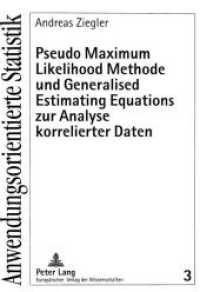- ホーム
- > 洋書
- > 英文書
- > Science / Mathematics
Full Description
Enhanced Sampling Methods for Molecular Dynamics: Algorithms, Implementations, and Applications covers sampling techniques for molecular dynamics studies of equilibrium and kinetics, discussing the theory, algorithm, and implementation of techniques for equilibrium studies, such as Umbrella Sampling, Replica Exchange, Generalized Ensembles, and Metadynamics. The book considers exact and approximate approaches of enhanced sampling, their speed, rate of convergence, and accuracy. Chapters consider path integral formulation, Weighted Ensemble, Transition Path Sampling, and Milestoning.
Finally, simple, detailed examples illustrate enhancements and prepare the reader for their use in more complex systems, making this an ideal resource for computational chemists, biochemists (graduate students and postdoctoral fellows), and computational and theoretical scientists who study molecular processes.
Contents
1. Introduction: "To understand it, simulate it”
2. Coarse variables and reaction coordinates
3. Rough energy landscapes, why is it a problem?
4. Computational statistical mechanics of equilibrium
5. Computational and experimental observables in equilibrium
7. The first enhanced sampling method is umbrella sampling
8. Computing free energy differences
9. Flattening free energy landscapes as a function of coarse variables
10. The energy as a reaction coordinate
11. The temperature as a reaction coordinate
12. Sampling kinetic observables with trajectories
13. Computing reaction coordinates from reactive trajectories
14. Statistical Learning of reaction space
15. Enhancing the sampling of complete trajectories
16. Exact estimation of the fluxes of reactive trajectories
17. The first hitting point distribution
18. Approximating the first hitting point distribution
19. Computing kinetic observables with trajectory fragments
20. Kinetics on a network
21. Experimental data as a tool to enhance simulations
22. Simulating very large systems
23. Which method should I use?
24. Discussion of remaining challenges







